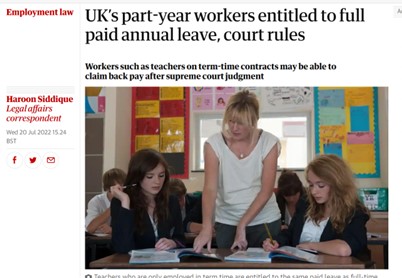
Supreme Court rules that term time workers are entitled to full annual leave
Anyone employed on a term time contract, or employing a worker on a term time contract, should check the contract of employment to see if they are complying with the law on the calculation of annual leave following a Supreme Court judgment earlier this week. A link to a report by the Guardian on this case is below.
Some employers pro rata holiday for term time workers, so that they only accrue holiday during their working weeks. However, following the Supreme Court decision, their holiday pay should be calculated on a full time annual basis. Employees affected by these changes could also be entitled to back pay.
If you need any legal advice regarding these changes, please do get in touch with one of our team. [email protected]
The Guardian reports…
Thousands of teachers on term-time-only contracts, and workers with similar arrangements, could be entitled to back pay after a ruling by the UK’s highest court.
The five supreme court justices were asked to consider whether Lesley Brazel, a music teacher with a continuing contract but who worked only certain weeks of the year, was entitled to 5.6 weeks of paid annual leave, the minimum stipulated by the UK Working Time Regulations (WTR).
Her employer, Harpur Trust, a charity that runs Bedford Girls’ School, where Brazel works, argued that she was not entitled to the 5.6 weeks afforded to full-time workers and that Brazel’s leave entitlement should be calculated proportionally so the weeks in which she did not work reduced her paid annual leave.

The judges unanimously found in favour of Brazel, upholding a decision of the court of appeal. In the written judgment, Lady Rose and Lady Arden wrote that Harpur had argued “that the construction upheld by the court of appeal leads to an absurd result, that absurdity being that a worker in Mrs Brazel’s position (and in the position of some of the other hypothetical workers posited by the Harpur Trust) receives holiday pay which represents a higher proportion of her annual pay than full-time or part-time workers who work regular hours.
“We recognise, of course, that a construction which leads to an absurd result is, in general, unlikely to be what parliament intended. However, we do not regard any slight favouring of workers with a highly atypical work pattern as being so absurd as to justify the wholesale revision of the statutory scheme which the Harpur Trust’s alternative methods require.”
They said the idea of leave accruing over the year as and when hours are worked was inconsistent with the WTR. Rose and Arden also said the methods proposed by Harpur would require “extremely complicated” calculations and for all employers and workers to keep detailed records of every hour worked, even if they were not paid at an hourly rate.